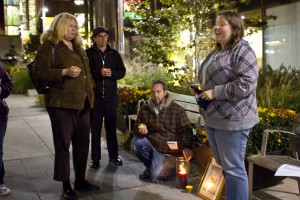Kitchener remembers

“We are a group that has come together to focus on issues of social and economic justice,” said Shannon Balla as demonstrators gathered in Kitchener Sunday to remember the passing of the 19 year-old Ashley Smith, who took her life in 2007 while incarcerated at Kitchener’s Grand Valley Institution for Women.
Sunday’s event was meant to seek societal changes that would prevent incidences like this from occurring again. Balla, a member of local social justice organization Poverty Makes Us Sick, shared this perspective at a candlelight vigil that occurred Sunday evening.
Diagnosed with borderline personality disorder, Smith was moved between institutions for six years before being placed at Grand Valley. Controversy surrounding her death occurred because prison guards allegedly watched Smith tie a ligature round her neck and were ordered not to intervene.
A Coroner’s Inquest is currently in its final stages investigating into the death.
This incident led to the formation of the We Remember Ashley Smith Campaign, which took part in an Ontario-wide campaign called the Raise the Rates Week of Action.
“We come together for our annual vigil to remember the tragedy of a life lost to the violence of our institutions,” explained Balla, who was involved in the campaign. “As we mourn, we are also tasked, as a community with seeking fundamental changes to our society.”
The campaign also challenged Ontario’s minimum wage rates, asking for an increase to $14.
Balla explained that this increase “would allow people to live ten per cent above the poverty line, as opposed 19 per cent below, as they currently are.”
Ian Stumpf, an organizer of the We Remember Ashley Smith event, also explained the connection between Ashley Smith’s fate and the call for increased minimum wage.
“The government seems to target people in poverty as people who commit crimes,” he said.
This problem allegedly increases incrimination rates and causes over-populated prisons. The group stressed that if the government allows for a higher-standard of living, fewer citizens will be subject to the psychological cruelty found in Ontario’s prisons.
“And not only cruelty,” Balla said. “But also silencing of the prisoners.”
The campaign also attempted to erase the negative stigma that was attached to Smith when she was incarcerated in 2007. They believed that Smith was mistakenly pegged as a “troubled teen.” The campaign states that Smith was in fact a “tortured teen.”
“The campaign seeks to highlight that her torture was funded by our tax dollars and was carried out in a system that we all continue to allow to exist,” stated the We Remember Ashley Smith campaign in a media release prior to Sunday’s event.
Poverty Makes Us Sick also believes that lack of knowledge is due to the government withholding information.
“What we’re trying to do today is focus on the act of remembering, as part of the issue with prisons is that people are taken out of our communities and we forget them, and then we feel less of a responsibility for them,” Balla concluded. “Just remembering is an act of resistance.”

